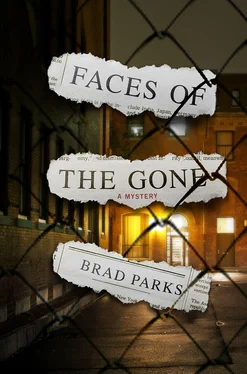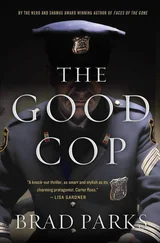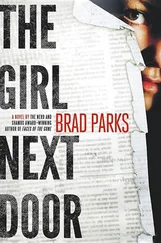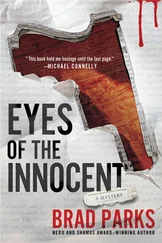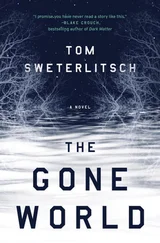Brad Parks - Faces of the Gone
Здесь есть возможность читать онлайн «Brad Parks - Faces of the Gone» весь текст электронной книги совершенно бесплатно (целиком полную версию без сокращений). В некоторых случаях можно слушать аудио, скачать через торрент в формате fb2 и присутствует краткое содержание. Год выпуска: 2010, ISBN: 2010, Издательство: Minotaur Books, Жанр: Триллер, на английском языке. Описание произведения, (предисловие) а так же отзывы посетителей доступны на портале библиотеки ЛибКат.
- Название:Faces of the Gone
- Автор:
- Издательство:Minotaur Books
- Жанр:
- Год:2010
- ISBN:9780312574772
- Рейтинг книги:3 / 5. Голосов: 1
-
Избранное:Добавить в избранное
- Отзывы:
-
Ваша оценка:
- 60
- 1
- 2
- 3
- 4
- 5
Faces of the Gone: краткое содержание, описание и аннотация
Предлагаем к чтению аннотацию, описание, краткое содержание или предисловие (зависит от того, что написал сам автор книги «Faces of the Gone»). Если вы не нашли необходимую информацию о книге — напишите в комментариях, мы постараемся отыскать её.
Faces of the Gone — читать онлайн бесплатно полную книгу (весь текст) целиком
Ниже представлен текст книги, разбитый по страницам. Система сохранения места последней прочитанной страницы, позволяет с удобством читать онлайн бесплатно книгу «Faces of the Gone», без необходимости каждый раз заново искать на чём Вы остановились. Поставьте закладку, и сможете в любой момент перейти на страницу, на которой закончили чтение.
Интервал:
Закладка:
Which is not to say it’s easy. As a rule, Newark residents don’t trust anyone. They especially don’t trust anyone who looks official, be they cops, politicians, or newspaper reporters. And they doubly don’t trust white folks, who are usually only there to arrest them or scam them.
Therefore, for someone of my pallor and profession, milking information from the streets involved bridging that rather huge chasm of natural distrust. Some white reporters running in the hood try to “act black”-talk the vernacular, quote rappers, dress like they’re going on BET-but that was never going to work for me.
The fact of the matter is I’m Carter Ross, born to an upper-middle-class family in the privilege of Millburn, one of New Jersey’s finer suburbs. I was raised by two doting parents alongside an older brother who’s now a lawyer and a younger sister who’s now a social worker. We vacationed down the shore every summer, skied in Vermont every winter, and were taught to view Newark as the kind of place you heard about but did not visit. I was sheltered by some of New Jersey’s best prep schools until age eighteen, whereupon I went to Amherst College and spent four years around some of the nation’s most elite students. I just don’t have any street in me.
And anyone could see it. The things that allow me to blend into the tasteful decor at any of New Jersey’s better suburban shopping malls-my side-parted brown hair, my preference for button-down-collared shirts and pressed slacks, my awkwardly upright carriage, my precise diction and bland anywhere-in-America accent-made me a circus freak in the hood. Most people I pass on the street are polite enough to merely stare. A few openly point. People are constantly asking me if I’m lost.
Yet through the years, I had come to realize a simple fact of reporting: if you approach people with respect, listen hard, and genuinely try to understand their point of view, they will talk to you, no matter how different your background is. So that’s what I attempt to do.
Over the next three hours, I learned a lot about the neighborhood: how the vacant lot had once been home to a crack house, until the city got its act together and tore it down; how the public housing across the street, which had been slapped together by a developer known to be cozy with the mayor, was already falling apart; how the bar down the street, the Ludlow Tavern, just kept getting rougher, with the patrons leaving their knives at home and bringing their guns instead.
But I didn’t learn anything about the four victims, which suggested they weren’t from this part of town. Most Newark neighborhoods were tighter than outsiders realized, with familial connections that went back generations. If someone from the neighborhood got killed, you could always find a cousin or a friend-or a cousin of a friend whose aunt was distantly related to the victim’s stepmother. Something. But I had struck out.
By the time I was done canvassing and had returned to the vacant lot, a truck from a New York TV station had pulled up outside the church. No doubt, they were ready to lend great insight and understanding with their ferociously dogged reporting, which would consist of taking off just as soon as they had collected one usable five-second sound bite from the first “concerned citizen” they could find.
I don’t want to launch into too much of a rant against local television reporters. But if I were a modern-day Noah, I’d take the bacteria that causes the clap on my ark before I took one of them.
This reporter (I loathe to even use that word) was a typical TV news chick whose good looks were an entirely artificial creation. It was possible, underneath the layers of eye makeup and expensively treated hair, she might have once been an attractive human being. But who could tell anymore?
“I’m standing outside St. Mary’s Roman Catholic Church in Newark,” she began breathlessly, “where four bodies were found stacked like cordwood in this. . dammit .”
A gust of wind had sullied her hair, momentarily halting her unflappable dedication to delivering the news.
“Come on. My fingers are freezing,” her cameraman complained.
“Shut up . You think I’m warm here?” she said testily, running a gloved hand through her hair.
Then she saw me, instantly dropped the bitchy act, and affected a huge smile, as if she were happy to see me-which, I knew, meant she was going to try to leach information out of me. TV chicks believe they can get stuff from male newspaper reporters simply by flipping their hair and batting their eyes a few times. They do this because they assume male newspaper reporters are hard up. Most of the time, they’re absolutely correct. But I can proudly say I don’t let Mr. Johnson do my thinking when I’m on the job. I save that for after work.
“Hiiiiiii,” she said, managing to fire off two hair flips inside seven seconds. “Alexis Stewart, News 8 Action News Team.”
“Hi,” I said flatly.
“Do you know where any of the victims’ families live, by any chance? I’d love to get a bite from a grieving mom.”
“Yeah. They all live just a few blocks up that way,” I lied. “They’re in an apartment complex called Seth Boyden. You might want to hurry. I hear they’re just about to hold a news conference.”
The News 8 Action News Team rushed off like they were headed to a free hair spray handout, leaving me alone on Ludlow Street. A strong gust of wind sliced into me as I gazed at the vacant lot, trying to imagine what circumstances had led four people to this spot for the purpose of taking their last breaths.
Four bodies. It was a big number. There had only been one other quadruple homicide in Newark in the last quarter century, mostly because the drug-related killings that typified the city’s murders tended to be one- or two-at-a-time type affairs. Contrary to what suburbanites believed, the drug trade in Newark was not highly organized. There were no kingpins, no major operators, no Evil Geniuses behind it all. The local gangs, who did most of the selling, were all neighborhood based, with little centralization beyond that. Even though all Bloods wore red and all Crips wore blue, each set operated independently. The violence they committed tended to be limited in scale.
So four bodies suggested something new, something much more pernicious. To herd together four people, lead them to a faraway vacant lot, and kill them? That took planning, organization, coordination. And those were higher-order skills we hadn’t seen from the street before.
I soon realized I wasn’t alone in staring at the lot. An older guy with long, salt-and-pepper dreadlocks was doing the same thing. He was wearing the uniform of a Newark Liberty International Airport baggage handler and was carrying some flowers.
“Hi, there,” I said.
“Hey, Bird Man,” he said.
On the streets, the Newark Eagle-Examiner was known as “the Bird.” Its reporters were called “Bird Man” or “Bird Woman.” It was an unfortunate consequence of the long-ago marriage of the Newark Eagle and the Newark Examiner into the Eagle-Examiner . And while the merger made us New Jersey’s largest and most respected daily newspaper, it also made us sound like we were the official publication of the Audubon Society. I suppose the reporters didn’t have it as bad as some: the guys who tossed the papers onto people’s front porches in the morning were called “Bird Flippers.”
“Gee, what makes you think I’m a reporter?” I asked, trying not to sound too sarcastic.
“You got that nosy look.”
“You can call me Carter,” I said, sticking out my hand for him to shake. He looked a little surprised-people in the hood often are when a white person is friendly toward them-then grabbed it and pumped it twice. His hands felt like they had gripped a lot of Louis Vuitton knockoffs in their time.
Читать дальшеИнтервал:
Закладка:
Похожие книги на «Faces of the Gone»
Представляем Вашему вниманию похожие книги на «Faces of the Gone» списком для выбора. Мы отобрали схожую по названию и смыслу литературу в надежде предоставить читателям больше вариантов отыскать новые, интересные, ещё непрочитанные произведения.
Обсуждение, отзывы о книге «Faces of the Gone» и просто собственные мнения читателей. Оставьте ваши комментарии, напишите, что Вы думаете о произведении, его смысле или главных героях. Укажите что конкретно понравилось, а что нет, и почему Вы так считаете.
